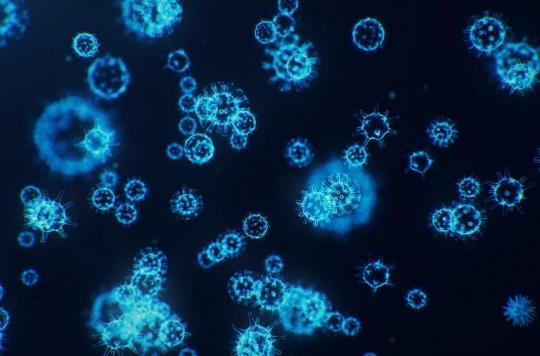A new study from the University of Glasgow shows how a simple cold virus can prevent SARS-CoV-2 from infecting the body by blocking its replication in airway cells.

- The research, carried out in vitro on human epithelial cells, shows that the rhinovirus HRV-16 blocks the replication of SARS-CoV-2 when it is inoculated 24 hours before.
- In the event that SARS-CoV-2 is the first virus to infect cells, inoculation with HRV-16 significantly lowers its viral load.
What if the best treatment for Covid-19 was… a simple cold?
This is the conclusion reached by researchers at the Virus Research Center at the University of Glasgow (Scotland). In a study published in Journal of Infectious Diseasesthey show that human rhinovirus 16 (HRV-16) prevents SARS-CoV-2 from replicating and therefore from infecting a subject when it is present before it in the cells of the respiratory epithelium.
A decrease in viral load when the cold infects the body
Rhinoviruses are the most common respiratory viruses in humans. Responsible for colds, nasopharyngitis or even rhinitis, they circulate abundantly within the population during the winter months and can, according to the model, prevent other viruses from also infecting the body. “Our research shows that human rhinovirus triggers an innate immune response in human respiratory epithelial cells that blocks the replication of the Covid-19 virus”explains Dr Pablo Murcia, from the Center for Virus Research at the University of Glasgow.
The researchers cultured human epithelial cells in the laboratory to simulate the lining of the airways. These cells were then infected following two scenarios: first with SARS-CoV-2 infecting the cells first, followed by rhinovirus HRV-16 24 hours later, and then vice versa.
They then found that when SARS-CoV-2 was the first “intruder” to infect the body, its replication proceeded normally until the addition of HRV-16: its quantity of virions, i.e. ie the particles containing the viral RNA, decreases, while that of HRV-16 increases sharply until the third day. This viral load then gradually decreases.
HRV-16 blocks SARS-CoV-2 replication
When HRV-16 is the first virus to infect cells, it simply blocks SARS-CoV-2 when introduced. The coronavirus fails to replicate, and is no longer detectable 24 hours after being inoculated.
For the researchers, these results show that the presence of HRV-16 does indeed block the replication of SARS-CoV-2, but that the coronavirus does not prevent rhinovirus infection.
“This means that the immune response caused by mild and common cold virus infections could provide some level of transient protection against Covid-19, potentially blocking the transmission of SARS-CoV-2 and reducing the severity of Covid-19. -19”analyzes Dr. Murcia.
The latter explains that the next stage of the work will consist of “study what happens at the molecular level during these virus-virus interactions, to better understand their impact on disease transmission”then “to use this knowledge to our advantage, hopefully developing strategies and measures to control Covid-19 infections”.
Dr. Murcia makes it clear that“in the meantime, vaccination is our best method of protection against Covid-19”.


















